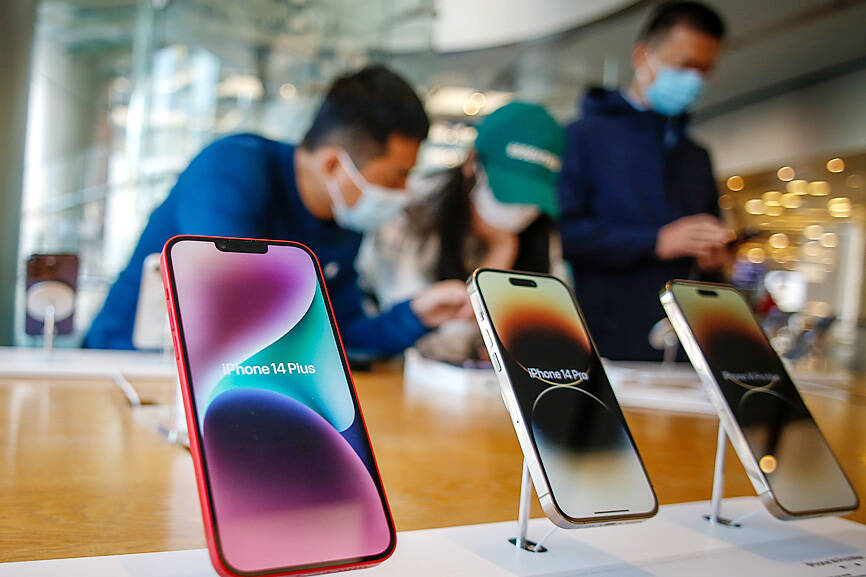Largan Precision Co (大立光), a supplier of smartphone camera lenses to Apple Inc, on Saturday reported that its sales for last month are its highest in 23 months after new phone launches increased orders.
The company posted NT$5.21 billion (US$161.88 million) in consolidated sales, up 24 percent from a year earlier and also up 2 percent from a month earlier, it said in a statement.
Last month’s sales were the company’s highest since November 2020, when its revenue was NT$5.24 billion, company data showed.

Photo: EPA-EFE
The rising sales momentum last month, a traditional peak season, largely came after Apple Inc’s launch of the iPhone 14 series in September, analysts said.
Largan is one of Apple’s largest suppliers.
Lenses with a resolution of 20 megapixels or more — a higher-margin product and one of Largan’s specialties — accounted for 10 to 20 percent of Largan’s sales last month, the company said.
Lenses of 10 to 20 megapixels accounted for 50 to 60 percent of Largan’s sales, 8 to 10 megapixel lenses comprised about 10 percent, and other products such as voice coil motors constituted 30 to 40 percent of sales, the company said.
In the first 10 months of this year, Largan’s consolidated sales stood at about NT$38.50 billion, up 1.02 percent from a year earlier, reversing a 2 percent year-on-year fall in the first nine months.
Sales for this month are expected to remain little changed from last month as clients continue to launch new smartphones, Largan said.
Largan shares rose 5.25 percent last week from the previous month, closing at NT$1,905 on Friday, after foreign institutional investors registered a net buy of its shares for five trading sessions in the week.
The increase outperformed the TAIEX, which rose by only 1.86 percent for the week.

Vincent Wei led fellow Singaporean farmers around an empty Malaysian plot, laying out plans for a greenhouse and rows of leafy vegetables. What he pitched was not just space for crops, but a lifeline for growers struggling to make ends meet in a city-state with high prices and little vacant land. The future agriculture hub is part of a joint special economic zone launched last year by the two neighbors, expected to cost US$123 million and produce 10,000 tonnes of fresh produce annually. It is attracting Singaporean farmers with promises of cheaper land, labor and energy just over the border.

US actor Matthew McConaughey has filed recordings of his image and voice with US patent authorities to protect them from unauthorized usage by artificial intelligence (AI) platforms, a representative said earlier this week. Several video clips and audio recordings were registered by the commercial arm of the Just Keep Livin’ Foundation, a non-profit created by the Oscar-winning actor and his wife, Camila, according to the US Patent and Trademark Office database. Many artists are increasingly concerned about the uncontrolled use of their image via generative AI since the rollout of ChatGPT and other AI-powered tools. Several US states have adopted

A proposed billionaires’ tax in California has ignited a political uproar in Silicon Valley, with tech titans threatening to leave the state while California Governor Gavin Newsom of the Democratic Party maneuvers to defeat a levy that he fears would lead to an exodus of wealth. A technology mecca, California has more billionaires than any other US state — a few hundred, by some estimates. About half its personal income tax revenue, a financial backbone in the nearly US$350 billion budget, comes from the top 1 percent of earners. A large healthcare union is attempting to place a proposal before

KEEPING UP: The acquisition of a cleanroom in Taiwan would enable Micron to increase production in a market where demand continues to outpace supply, a Micron official said Micron Technology Inc has signed a letter of intent to buy a fabrication site in Taiwan from Powerchip Semiconductor Manufacturing Corp (力積電) for US$1.8 billion to expand its production of memory chips. Micron would take control of the P5 site in Miaoli County’s Tongluo Township (銅鑼) and plans to ramp up DRAM production in phases after the transaction closes in the second quarter, the company said in a statement on Saturday. The acquisition includes an existing 12 inch fab cleanroom of 27,871m2 and would further position Micron to address growing global demand for memory solutions, the company said. Micron expects the transaction to